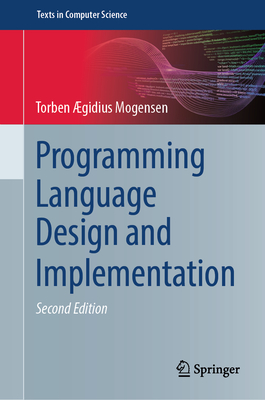Foundations of Programming Languages
暫譯: 程式語言的基礎
Seyed H. Roosta
- 出版商: Thomson
- 出版日期: 2002-08-15
- 售價: $920
- 貴賓價: 9.8 折 $901
- 語言: 英文
- 頁數: 652
- 裝訂: Hardcover
- ISBN: 0534393039
- ISBN-13: 9780534393038
-
相關分類:
Functional-programming
下單後立即進貨 (約5~7天)
買這商品的人也買了...
-
 Visual C++ 6 教學手冊 (Beginning Visual C++ 6)
Visual C++ 6 教學手冊 (Beginning Visual C++ 6)$580$493 -
 計算機組織與設計--軟硬體界面第二版 (Computer Organization & Design, 2/e)
計算機組織與設計--軟硬體界面第二版 (Computer Organization & Design, 2/e)$680$578 -
 SQL Server 2000 設計實務
SQL Server 2000 設計實務$650$553 -
 Modern Systems Analysis and Design, 3/e
Modern Systems Analysis and Design, 3/e$1,000$900 -
 Operating System Concepts, 6/e (Windows XP Update)
Operating System Concepts, 6/e (Windows XP Update)$1,050$1,029 -
 演算法導論 (Introduction to Algorithms, 2/e)
演算法導論 (Introduction to Algorithms, 2/e)$860$430 -
 Microsoft Windows 2000 Professional Exam 70-210 考試培訓教材第二版 (Microsoft Windows 2000 Professional, 2/e)
Microsoft Windows 2000 Professional Exam 70-210 考試培訓教材第二版 (Microsoft Windows 2000 Professional, 2/e)$890$703 -
 作業系統概念 (Operating System Concepts, 6/e Windows XP Update)
作業系統概念 (Operating System Concepts, 6/e Windows XP Update)$780$741 -
 專案管理立即上手 (Project Management)
專案管理立即上手 (Project Management)$280$266 -
 ASP.NET 程式設計徹底研究
ASP.NET 程式設計徹底研究$590$466 -
 使用案例寫作實務 - 寫作指南、祕訣與範本 (Writing Effective Use Cases)
使用案例寫作實務 - 寫作指南、祕訣與範本 (Writing Effective Use Cases)$650$553 -
 STRUTS 實作手冊(Struts in Action: Building Web Applications with the Leading Java Framework)
STRUTS 實作手冊(Struts in Action: Building Web Applications with the Leading Java Framework)$690$538 -
 Microsoft Windows Server 2003 系統實務
Microsoft Windows Server 2003 系統實務$780$663 -
 重構─改善既有程式的設計
重構─改善既有程式的設計$720$612 -
 Practical Java Programming Language Guide 中文版 (Practical Java Programming Language Guide)
Practical Java Programming Language Guide 中文版 (Practical Java Programming Language Guide)$560$476 -
 行動 Linux─KNOPPIX 改造手冊
行動 Linux─KNOPPIX 改造手冊$290$247 -
 Java 程式設計藝術 (Java How to Program, 5/e)(精裝本)
Java 程式設計藝術 (Java How to Program, 5/e)(精裝本)$880$792 -
 Effective Java Programming Language Guide 中文版 (Effective Java Programming Language Guide)
Effective Java Programming Language Guide 中文版 (Effective Java Programming Language Guide)$560$476 -
 Microsoft Windows Server 2003 架站實務
Microsoft Windows Server 2003 架站實務$580$493 -
 第五項修練II實踐篇(上)─思考、演練與超越 (The Fifth Discipline Filedbook: Strategies and Tools for Building a Learning Organization)
第五項修練II實踐篇(上)─思考、演練與超越 (The Fifth Discipline Filedbook: Strategies and Tools for Building a Learning Organization)$460$391 -
 第五項修練II實踐篇(下)─共創學習新經驗 (The Fifth Discipline Fieldbook: Strategies and Tools for Building a Learning Organizaiton)
第五項修練II實踐篇(下)─共創學習新經驗 (The Fifth Discipline Fieldbook: Strategies and Tools for Building a Learning Organizaiton)$460$391 -
 鳥哥的 Linux 私房菜-伺服器架設篇
鳥哥的 Linux 私房菜-伺服器架設篇$750$638 -
 鳥哥的 Linux 私房菜─基礎學習篇增訂版
鳥哥的 Linux 私房菜─基礎學習篇增訂版$560$476 -
 Web 配色事典﹝活用網頁安全色﹞
Web 配色事典﹝活用網頁安全色﹞$390$304 -
 第五項修練-學習型組織的藝術與實務, 3/e
第五項修練-學習型組織的藝術與實務, 3/e$600$510
相關主題
商品描述
"Foundations of Programming Languages" presents topics relating to the design and implementation of programming languages as fundamental skills that all computer scientists should possess. Rather than provide a feature-by-feature examination of programming languages, the author discusses programming languages organized by concepts. The first five chapters provide students with a successful foundation for the study of programming languages. This includes topics such as the data structures, expression notations, and abstraction in chapters 2 and 3. Later, metalanguages are introduced for the formal specification of the syntax and semantics of computer programming languages. This material is presented in a manner that allows one to customize the coverage based on course need. Seyed Roosta also teaches paradigm-specific topics with special care, dedicating two full chapters to each paradigm. The first focuses on the specifications of paradigm, including an emphasis on abstraction principles to help students understand the motivation behind certain design issues. The second chapter discusses the implementation issues related to the paradigm, including the use of popular programming languages to help students comprehend the relationship to the design issues discusses earlier. Paradigms discussed include the imperative, object-oriented, logic, functional, and parallel. The book concludes with new paradigms of interest today, including Data Flow, Database, Network, Internet, and Windows programming.
Table of Contents
1. INTRODUCTION.
2. DATA TYPES.
3. PRINCIPLES OR PROGRAMMING LANGUAGES:
DESIGN SPECIFICATION.
4. SPECIFICATION OF PROGRAMMING LANGUAGES: SYNTAX
SPECIFICATION.
5. DESCRIPTION OF PROGRAMMING LANGUAGES: SEMANTIC
SPECIFICATION.
6. SPECIFICATION OF IMPERATIVE PROGRAMMING.
7. IMPERATIVE
PROGRAMMING LANGUAGES.
8. SPECIFICATION OF OBJECT-ORIENTED
PROGRAMMING.
9. OBJECT-ORIENTED PROGRAMMING LANGUAGES.
10. SPECIFICATION
OF DECLARATIVE PROGRAMMING.
11. DECLARATIVE PROGRAMMING LANGUAGE.
12.
SPECIFICATION OF APPLICATIVE PROGRAMMING.
13. APPLICATIVE PROGRAMMING
LANGUAGES.
14. SPECIFICATION OF PARALLEL PROGRAMMING.
15. PARALLEL
PROGRAMMING LANGUAGES.
16. OTHER PROGRAMMING LANGUAGE METHODS.
Appendix.
Bibliography.
Symbols.
Author Index.
Subject
Index
商品描述(中文翻譯)
《程式語言基礎》介紹了與程式語言設計和實現相關的主題,這些都是所有計算機科學家應具備的基本技能。作者並未逐一檢視程式語言的特性,而是根據概念來討論程式語言。前五章為學生提供了學習程式語言的成功基礎,涵蓋了第二章和第三章中的資料結構、表達式符號和抽象等主題。隨後,介紹了金屬語言,用於正式規範計算機程式語言的語法和語義。這些材料以便於根據課程需求自訂內容的方式呈現。Seyed Roosta 也特別關注特定範式的主題,為每個範式專門撰寫了兩整章。第一章專注於範式的規範,強調抽象原則,以幫助學生理解某些設計問題背後的動機。第二章則討論與範式相關的實現問題,包括使用流行的程式語言來幫助學生理解與先前討論的設計問題之間的關係。討論的範式包括命令式、物件導向、邏輯、函數式和並行。書籍最後介紹了當今感興趣的新範式,包括資料流、資料庫、網路、互聯網和 Windows 程式設計。
《目錄》
1. 介紹
2. 資料類型
3. 程式語言原則:設計規範
4. 程式語言的規範:語法規範
5. 程式語言的描述:語義規範
6. 命令式程式設計的規範
7. 命令式程式語言
8. 物件導向程式設計的規範
9. 物件導向程式語言
10. 宣告式程式設計的規範
11. 宣告式程式語言
12. 應用程式設計的規範
13. 應用程式語言
14. 並行程式設計的規範
15. 並行程式語言
16. 其他程式語言方法
附錄
參考文獻
符號
作者索引
主題索引

























